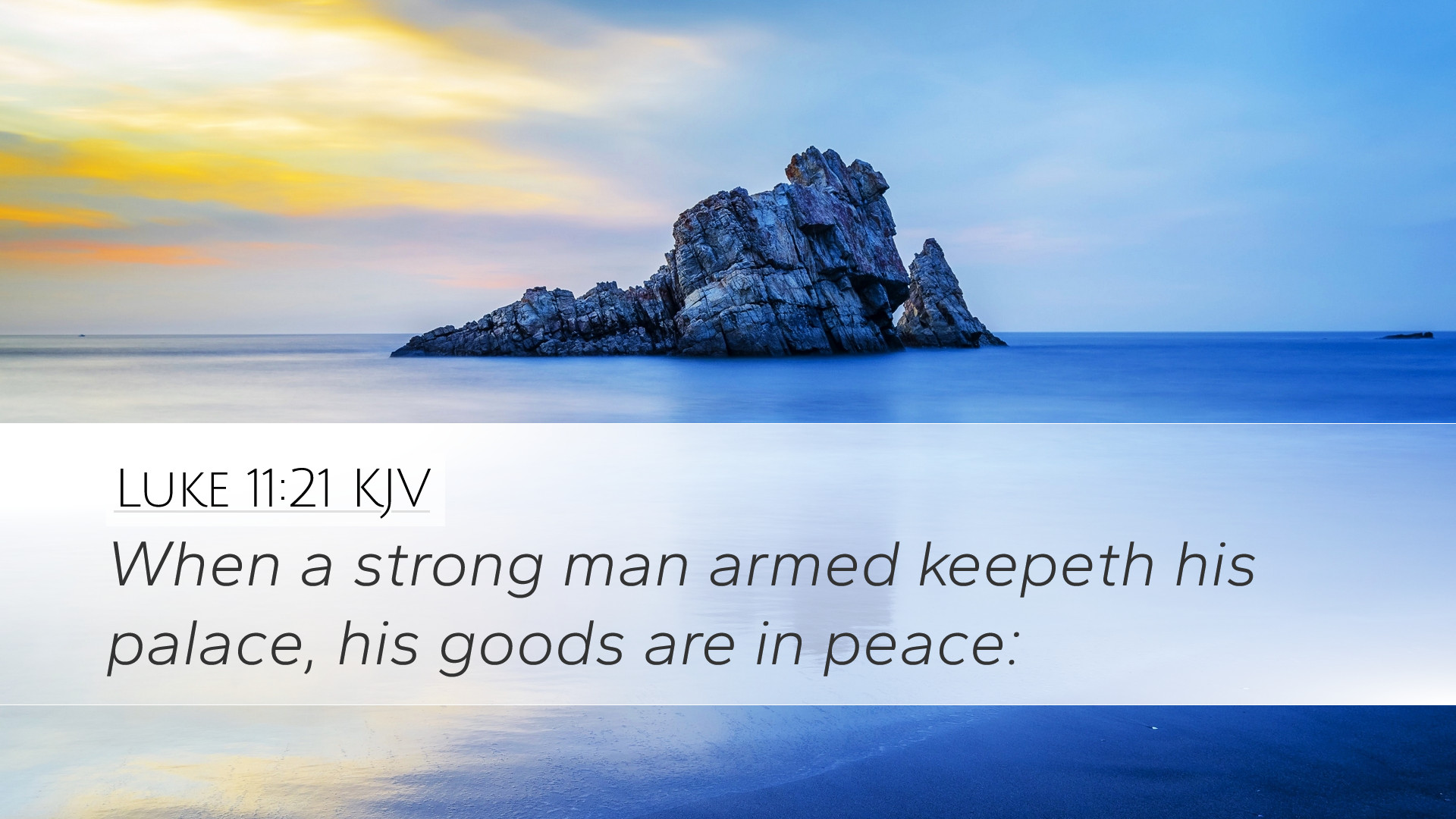Commentary on Luke 11:21
Luke 11:21 reads: "When a strong man, fully armed, guards his own palace, his goods are in peace." This verse
serves as an important parable within the teachings of Jesus, offering profound insights into the nature of spiritual
warfare, the protection of one's possessions, and the overarching theme of the Kingdom of God.
Contextual Background
In order to understand the weight of Luke 11:21, it is crucial to contextualize it within the chapters leading
to this moment. Jesus is engaged in a discourse regarding spiritual authority and the confrontation between
light and darkness. This verse notably illustrates the idea of strength and the efforts required to maintain
that strength in the face of opposition.
Analysis of Key Concepts
-
Strong Man:
The "strong man" in this verse symbolizes the authoritative power and control that one can wield.
This concept is often interpreted as representative of Satan or evil forces that seek to dominate and
possess what is good. Matthew Henry points out that the strong man’s strength can secure his possessions,
reflecting the power of darkness to hold captive those who are susceptible without the intervention of
a stronger force.
-
Fully Armed:
The imagery of being "fully armed" brings to mind readiness and preparedness. Albert Barnes emphasizes
that this armed status serves as a safeguard against potential threats, suggesting a metaphor for
spiritual vigilance. The necessity of being armed suggests that Christians must also take up their
spiritual armor highlighted in Ephesians 6:10-18.
-
Guarding One’s Palace:
The "palace" signifies not only physical property but can also be interpreted as one’s heart and life.
Adam Clarke indicates that this reflects the importance of protecting one’s spiritual and moral
possessions. This guarding process involves an active participation in resisting temptation and evil.
-
Goods in Peace:
The phrase "his goods are in peace" speaks to the security that comes from effective guardianship. This
assurance reflects a life of spiritual peace where one is safeguarded against spiritual assaults.
The peace mentioned here is valuable for believers, often highlighted in Scripture as a fruit of the
Holy Spirit (Galatians 5:22).
Theological Implications
From a theological standpoint, this verse underscores the perpetual struggle between good and evil. The strong
man’s control indicates the temporary hold that evil can have; however, the following verses provide the good
news that a stronger one can overcome this possession.
The implication here is that true victory comes from a greater power—namely, Jesus Christ—who demonstrated
his authority over evil through his life, death, and resurrection. This confrontation asserts the necessity of
spiritual warfare and relying on divine strength.
Application for Believers
The principles inherent in Luke 11:21 offer several practical applications for individuals in the faith:
-
Vigilance: Believers are called to remain vigilant and cognizant of the spiritual battles
present in everyday life. Just as the strong man guards his palace, Christians must be alert and prepared.
-
Spiritual Preparation: It is essential for believers to equip themselves spiritually.
Regular prayer, study of Scripture, and community fellowship bolster their defenses against the schemes of
the enemy.
-
Dependence on Christ: Recognizing that ultimate strength and victory flow from Jesus
himself is vital. Believers are reminded to draw upon His power to overcome darkness and temptation.
-
Peace in Christ: The assurance that comes from being under Christ's protection provides
a profound sense of peace amidst life's storms. This peace guards hearts and minds in ways that are
transformative and sustaining.
-
Community Support: Engaging with fellow believers in guarding against spiritual
attacks fosters a communal sense of responsibility and support, as the church operates as a collective
body of defense against evil influences.
Conclusion
Luke 11:21 encapsulates a profound truth regarding the nature of spiritual authority and the battle between
good and evil. The teachings and insights garnered from public domain commentaries provide a robust framework
for understanding Jesus’ message within this verse. As pastors, students, theologians, and Bible scholars
engage with this passage, the emphasis on vigilance, spiritual preparation, and reliance on Christ emerges as
a clarion call for all believers to actively participate in the spiritual reality of their lives. By doing
so, they reflect the light of Christ in a world that often seems dominated by darkness.


